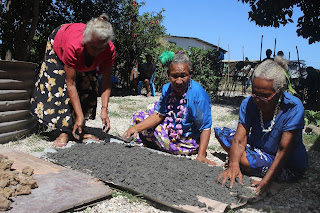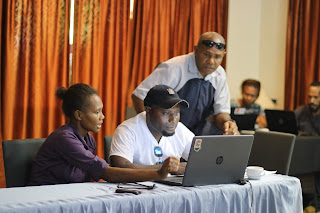HELARO HOPES TO REVIVE POTTERY CULTURE
Hailing from Porebada village is 95-year-old Lahui Arua Tarupa the oldest renowned ceramic artist and instructor perhaps in the Motuan society. She carries on the age old tradition of women potters; Born in this coastal fishing village, in 1924, like any other Motuan woman growing up, it was customary that she learn the skills, art and technics of Pottery making from her mother and grandmother as well as the rituals surrounding this art of making pottery.
Women Working on the clay.
Almost a century today she and her children, her nieces and other relatives are clinging on that dying tradition by a thin thread to continue the legacy as acclaimed potters her people from that era have left behind.
In history, the maiden Hiri voyage on a Lakatoi is said to have sailed out of Boera Village to Gulf, thus the Hiri Trade commonly known to many, formed an important part of the culture of trade by the Motuan and Gulf people.
Travelling the harsh weather conditions to trade surpluses of clay pots, Kina shells – mother of pearl shell (oyster shells), Toea shells – cowrie shells in exchange for sago and knowledge in traditional skills in sustainable gardening, hunting, fishing, building and sailing. The clay pots played a significant role in this trade system.
Bubu Lahui with another matriach Bubu Dimere with few others have told tales of the trade system and its importance in securing wealth, peace and the role of pottery when trading with the Gulf people.
Bubu Lahui assisting the women work on the clay.
Bubu Lahui has witnessed and seen the changes occur through the years and much of what use to be the pride of their pottery culture has disappeared.
Doreka Dai a woman leader from Boera confirms that, ‘’only a few remaining experts are still alive today and it’s a challenge trying to lure the next generation to have interest in this dying tradition. It’s different now, most of us do not know the processes and techniques of firing a claypot. We have heard tales about this and have witnessed few in the earlier years of our lives but it’s not the same today’’.
‘’Pottery plays an integral role in Motuan Society and is used for rites and rituals such as weddings, births, marriages, and burials, and it often symbolizes hospitality and communality. The pots are also customary for household use, such as the large pot used for cooking, preserving food, storing water etc,’’ she said. Bubu Lahui with some of the women.
Final Products(clay pots).
With the introduction of western civilization and its impacts in various areas, no doubt it has affected the once vibrant and thriving system. The need to revive this ancient tradition saw one-woman leader from her Porebada village step out of her comfort zone and take on the challenge to bring back what is theirs.
Her name is Dobi Isaiah, President of Helaro (Hope) Association. A Community based organization that is based in Porebaba and provides empowerment programs for women in her village.
Dobi Isaiah.
In July of 2019, the association with the help of developer ExxonMobil limited and Advancing PNG: Women Leaders network held its first ever Hiri Motu Pottery Workshop in the village with an aim to set the course in reviving the dying pottery culture.
‘’So much has happened over time and we have seen that the very systems that make the fabric of culture has eroded, due to obvious influences. We want to revive the once thriving Motuan culture that played an important role in the Motuan society and the Hiri Trade.’’
‘’what we are trying to do is revive pottery making and to enable our younger women to continue passing on the skill to the next generation. Not only that but to help them negotiate their way around using our very own resources to better their livelihoods.’’
‘’We are blessed to have one of our matriarchs, 95-year-old Lahui Arua Tarupa still around to run through with us and teach us the techniques. She has seen for herself the changes that have happened and has raised her hand to assist, said Ms. Isaiah.’’
The workshop picked up interests from other stakeholders, one of which is the Motu Koita Council. During the closing of the workshop Chairman and Deputy Governor of NCD Dadi Toka Jnr applauded Helaro on initiating the training. The delighted Motuan son has thrown his support on the program.
Mr Toka Jnr checking out the claypots.
“The work that we are doing here is not to be treated lightly. The Motuans and the Koitabuans are now at the crossroad. Our identity is now at risk. That is why we want to do this kind of work all the time. We must not make this as a one-off workshop and then wait for another 10 years and come back and do another workshop.’’
‘’I’d like to thank the councilors and elders for their support in initiating and supporting Helaro on this project. ‘’
‘’I want to also acknowledge the two elderly women who have thrown their endless support in upskilling our next generation, Aunty Lahui and Aunty Dimere thank you. Their contribution in this program is immense. Without them, to run a program of this kind is going to be hard. Thank you Lohiamui (elderly women) you came and sat among us and this work was able to go forward.
‘’This initiative ‘’em yupla yet kamapim’’. You have taken this important step, and now partners have come in to work with you all to support this initiative. I must congratulate you for this great job’’, said Mr. Toka Jnr.
For Helaro, this initiative is hoped to develop and enhance skills, embrace culture and empower young people to hold on this important heritage. The Association would like to see a cultural centre established in the near future which will include a pottery factory for the women folk to learn and continue this age-old tradition.
Doreka Dai.
Doreka Dai who is also a member of Advancing PNG: Women Leaders Network, and a local from this area said the passing on the rich Motu cultural knowledge of Hiri pottery making from the generation that did the Hiri Motu trade to this generation is a great testament for this Women organisation who are taking the lead in this fast evolving digital society we live in.
‘’The true act of taking back PNG and Porebada is through these approach by taking back our inheritance and the unique identify that defines us as Motuans from this part of the region. I want to commend Helaro Association and the executives, its members, the Porebaba community for reviving the Hiri Pottery making and even going further to initiate this very important training’’, she said.
Mr Toka Jnr and Bubu Lahui.
She acknowledged and thanked ExxonMobil PNG, for believing and supporting women of Papua New Guinea to be vital development partners and demonstrated once again through APNG: WLN and Helaro Association. She believes that when women move forward the world moves with them.
On that note, Mr Toka Jnr has acknowledged the support of Advancing PNG: Women Leaders Network and his very happy with the collaboration that has happened and would like to see more of the Motu Koitabu councilors involved in this partnership.
He pledged his support of K5,000 for the pottery training to continue and has given the opportunity to the Helaro Association to display their pottery making skills during the 2019 Hiri Moale Festival.
Members of the Helaro Association.
END!!
Note: The story was first published on the Weekender Paper of the National, 04th October 2019.












Comments
Post a Comment